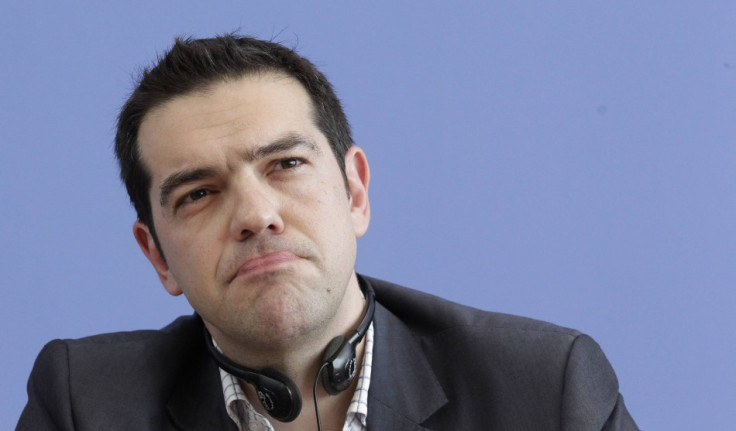Greece elections 2015: Why Alexis Tsipras and his far-left Syriza party are a threat to the eurozone

Just when you thought the eurozone crisis had settled down, sparks start flying again.
Greece's parliament has failed to elect a president, which means it must hold a new election little over two years since the last. It will probably take place before the end of January.
Political and financial instability stemming from Greece again is the last thing many in Europe want. But the looming prospect of a victory for the Syriza party is creating just that.
So what is Syriza and why are some people worried about it?
What is Syriza?
Syriza is a Greek political party formed of a coalition of hundreds of far-left groups. Its name is an acronym of its full title: Coalition of the Radical Left.
It was first formed in time for the 2004 Greek national election, but really came to prominence at the 2012 ballot after which it emerged as the country's second largest political party.
An upsurge of support for Syriza flows from the economic turmoil in bankrupt Greece, which had to be bailed out with €240bn (£188bn, $293bn) in emergency loans by the Troika: The European Union (EU), the European Central Bank (ECB) and the International Monetary Fund (IMF).
Greece has suffered a deep depression as its government – under the terms of the bailout loans – cut back on its public spending, which had propped up much of its economy. Unemployment is rife, running at a rate of around 26%. Very few Greeks haven't suffered because of the austerity.
Since the 2012 election, Syriza has held 71 of the Hellenic Parliament's 300 seats with 27% of the popular vote after it came second to the right-leaning New Democracy party, which won 108 seats and 30% of the national vote share.

Who is its leader?
Alexis Tsipras. He's a 40-year-old civil engineer by trade, but who has been active in far-left politics since his youth. He's been a member of the Greek parliament since his election in 2009.
Shortly after this he was elected leader of Syriza and has overseen their recent rise in popularity.
What does it believe?
Being far-left, it's no fan of the austerity it sees as imposed unfairly on the Greek people for the failures of politicians and the financial sector. According to its own website, it would "abolish the memoranda signed with the Troika of lenders when it assumes office and will re-negotiate the loans".
"At the same time it will promote a programme of social and economical reconstruction, aiming at development that promotes human needs and well-being and respects nature," says its website, which in essence means more fiscal spending.
Syriza is also non-interventionist in foreign policy, anti-Nato, anti-US influence and anti-free market. It's climate change-conscious and defines itself as socialist.
Why are some people worried about it winning the Greek election?
There's a strong chance Syriza could win the election in January 2015 and take control of running Greece. It won the popular vote in the 2014 European Parliament elections in the country, securing 26.5%. The New Democracy was trailing in second place with 22.7%.
A Syriza victory would pose difficult questions not just for Greece, but the whole of Europe and the eurozone currency bloc in particular.
Greece nearly exited the euro at the height of the eurozone crisis, which was triggered by the near-total loss of market confidence in its public finances after it emerged that its national debt and deficit were far higher than previously thought.
Investors fled Greece, leaving it facing bankruptcy because it could no longer afford to borrow from the markets in order to fund its significant public spending commitments.
So the Troika stepped in and bailed the country out with loans, but forced the government to accept strict budget rules and enact deep cuts to its spending.
Slowly, Greece has been repairing its finances as it tries to rebuild markets' trust in its economic stability and ability to repay its debt. But all of that is under threat if Syriza wins the election, given its promise to chuck out the Troika agreement.
It re-raises the prospect of Greece leaving the eurozone currency, an unprecedented move which would cause enormous financial disruption. It could drag the faltering eurozone economy back into a crisis which it has struggled to end, in turn dragging the global economy down with it.
And it will bring into question the sustainability of unpopular austerity programmes in other eurozone countries, such as France, which will unsettle European bondholders.
Some leaders are already struggling to juggle politics and austerity. A win for Syriza will boost its anti-austerity allies elsewhere in Europe, putting further pressure on those trying to enforce spending cuts and tax rises on recession-weary voters.
A renewed loss in confidence in eurozone sovereign debt would mean an increase in borrowing costs and so even deeper austerity.
It could even spark an attempt at fundamental reform of the eurozone to bring member states closer politically and economically through centralised institutions.
Potentially, it could break the whole project apart.
In mid-December, Tsipras tried to soothe concerns about his party. He said he wants to find a "negotiated solution" with the Troika, and that Syriza has "no intention to make unilateral moves unless they force us to make unilateral moves". We shall see.
© Copyright IBTimes 2024. All rights reserved.






